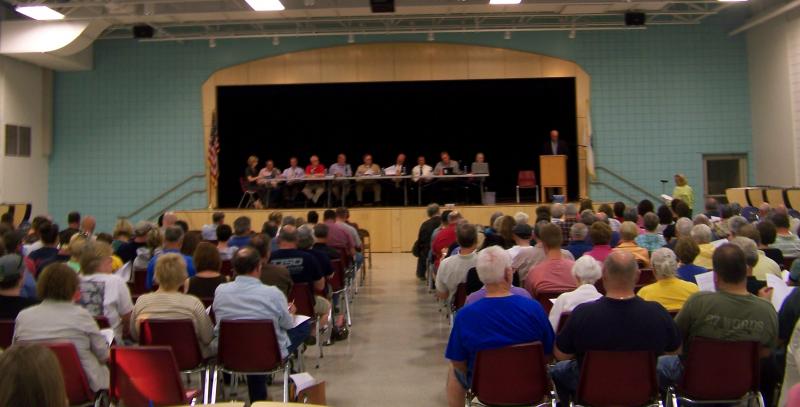Rochester voters back unified health district
Voters at Rochester Town Meeting overwhelmingly rejected a proposal that would have withdrawn the town from participation in the Marion Rochester Health District on Monday night.
The vote maintains an arrangement enacted 30 years ago where Marion and Rochester elect two separate Boards of Health but share one health agent, Karen Walega.
The Board of Selectmen backed the article, which both Boards of Health opposed. A handful of residents defended the district, and offered personal anecdotes about joint district benefits.
Robert Gillette spoke about a family member who found some relief from the rash caused by the shingles virus. Grants secured by the health district helped to make its expensive treatment more affordable.
Residents also cited cooperation between the towns. When the flu vaccine was in short supply locally, Marion donated 50 flu vaccinations to the town.
Rochester Board of Health Chair Sandra Keese cautioned voters to not approve the article.
“I support keeping the district exactly as it is. This seems like a really bad idea for something that’s worked well,” Keese said.
Selectmen said withdrawal would have eliminated insurance liability concerns.
“I don’t want to see the town, the health agent, or anyone else exposed to unnecessary risk,” Selectman Chair Naida Parker said. It’s undisputed that when the health agent is conducting official business locally she is covered by either town’s policy.
However, Parker said if Walega were to act in an official capacity outside of Rochester or Marion town limits she would not be covered.
That lack of coverage may expose Rochester to a lawsuit, in the event of an accident, Parker said.
Before the vote, Parker noted the article was not an attempt to have the health agent take direction from selectmen. The status of the agent, and the Board of Health, would not change, she said.
According to Rochester Town Counsel Blair Bailey, the Board of Selectmen and Finance Committee cannot negotiate changes to the health district’s budget under the current arrangement.
This became an issue when the Board of Health approved salary increases for district employees against a Board of Selectmen request to keep the salaries level funded.
The town is obligated to pay the health district. “Their budget isn’t part of the process,” Bailey said, and added that if the bill isn’t paid the difference becomes part of the tax levy.
Health district legal counsel Daniel Perry said there has been “poor” communication between Rochester selectmen and district officials.
It was unclear, he said, what the Marion Board of Health planned to do without Rochester sharing the costs of a joint health agent.
“We don’t know what they want, nobody’s asked them,” Perry said.
Two voters approved the measure.
Voters also approved the town’s operating budget after questioning increases to the town’s ambulance department.
Fire Chief Scott Weigel said the additional money would be used to upgrade the town’s basic life support service to an advanced life support system.
Voters approved an increase of $129,797 to the EMT budget from the previous year. The money was added to the salaries and wages and expense accounts.
Weigel said a $100,000 grant from Southcoast Hospital Systems will be used to purchase new equipment.
The basic life support rating limits the type of pre-hospital treatment town EMTs may provide.
If advanced life service is required, a neighboring town offering that care is called.
Resident William Warecki urged voters to adopt the article. Last summer, his wife needed ambulance service. During transport, she had to be moved from the Rochester ambulance to a Wareham one equipped with advanced life support.
“She was under all this stress, and this added more, by not having the right vehicle to respond...What [Weigel] is proposing to do is a good thing,” he said.












